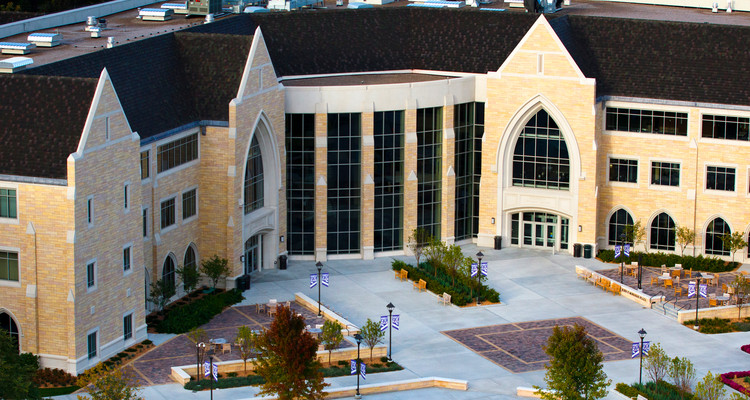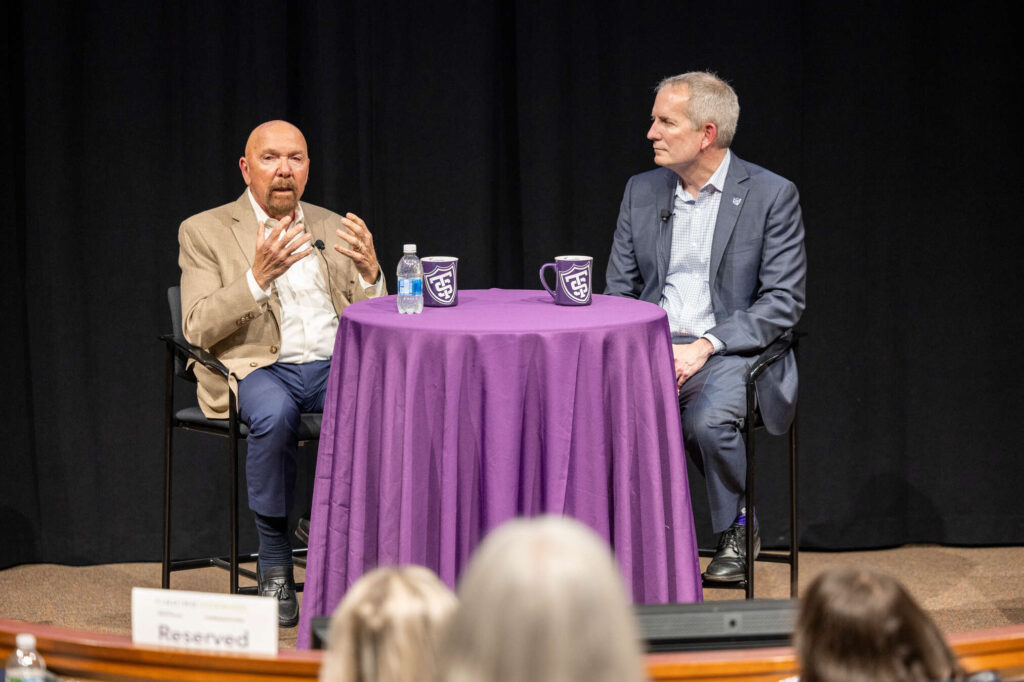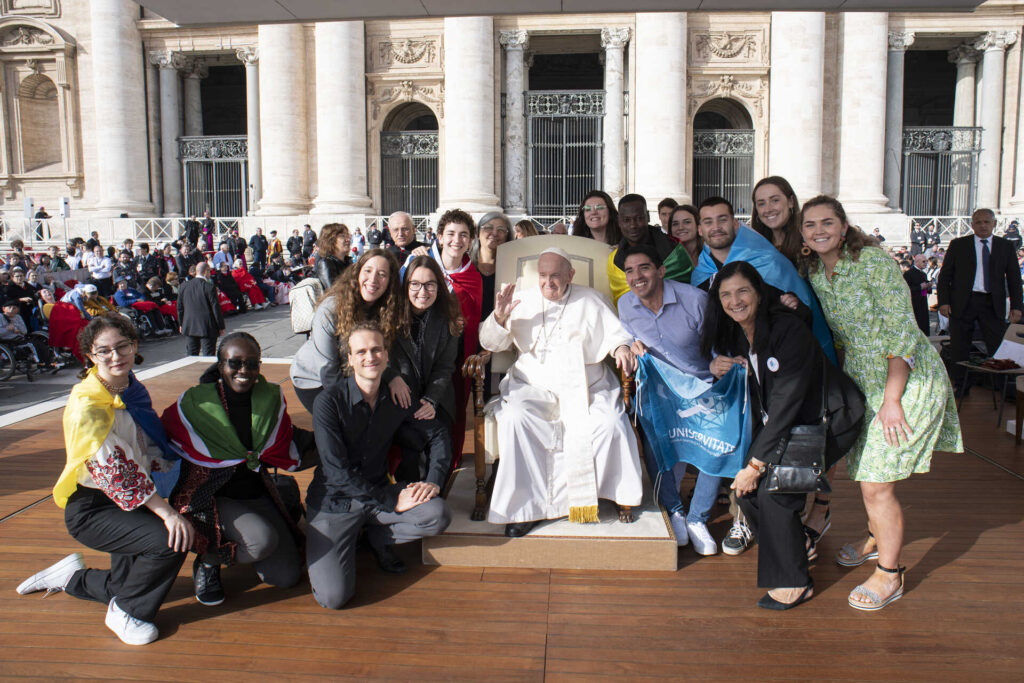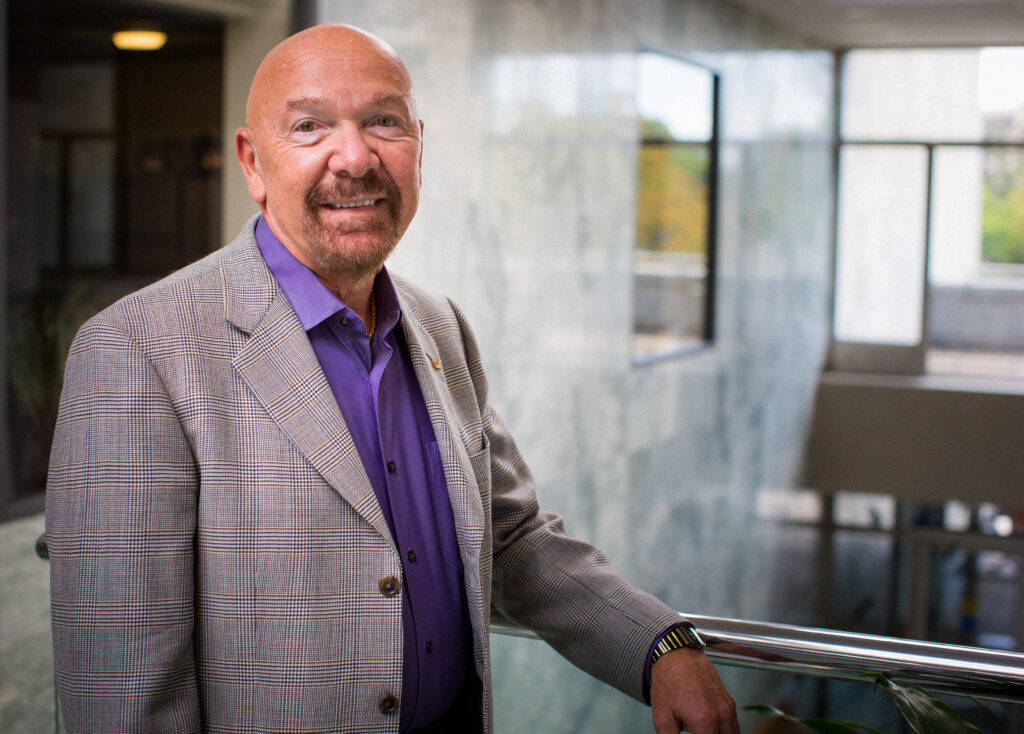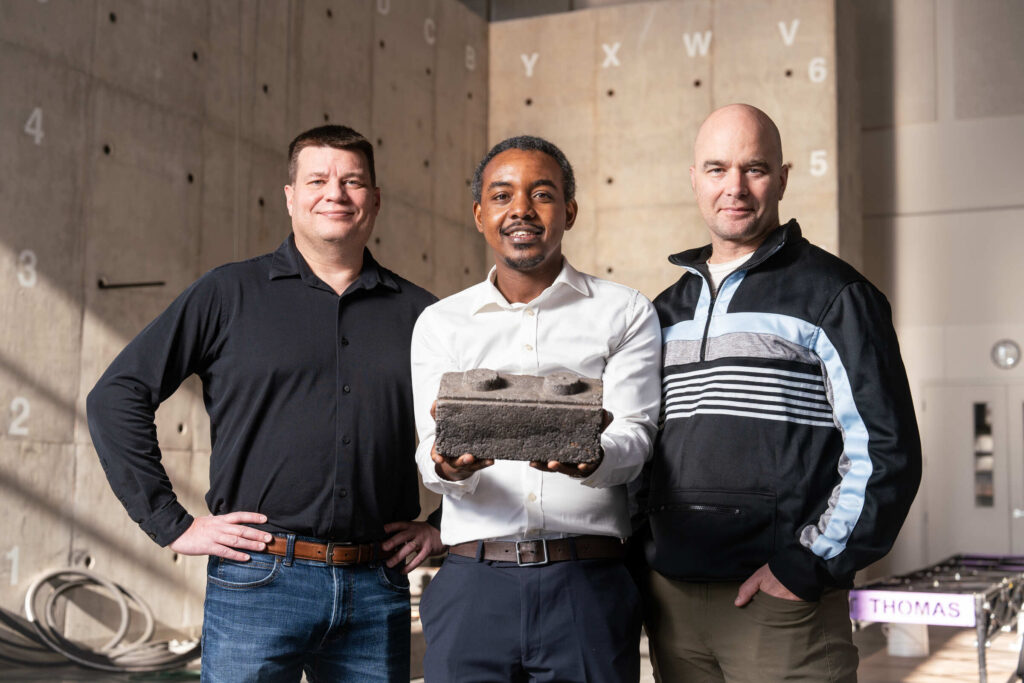Benefits can be powerful incentive and retention tools for any business. College and universities are no exception, and they have the unique ability to extend their own educational services as a benefit for employees.
Most higher education institutions – as many as 98 percent, according to a 2011 U.S. News article – take advantage of that opportunity and offer employees tuition remission for classes at their schools. That’s the case at St. Thomas, which also offers remission for employees’ dependents and spouses. (St. Thomas is also enrolled in several exchange programs with hundreds of other schools that allow varying remission rates for dependents and spouses.)
“The tuition exchange program itself, I’ve always recognized that as an incredible benefit,” said Carol Wilkie, a 13-year employee in Institutional Advancement whose daughter, Emily, is receiving 100 percent remission at Viterbo University. “There’s a whole list of things that make the St. Thomas employment experience as great as what it is, and this is certainly part of it.”
St. Thomas has offered tuition remission as a benefit continuously since the 1960s, said Deb Sagstetter, human resources compensation and benefits director. Over that time thousands of employees and their dependents and spouses have used the benefit to further their educations and attend many institutions that may not otherwise have been financially accessible.
“(Remission) is a huge thing for our family. I’m not sure the kids would be here without it,” said Tom Becker, an engineering adjunct faculty member who, along with his wife, Jan, an Institutional Advancement employee, will have four children who have attended St. Thomas after their youngest starts next fall. “It’s a pretty difficult conversation to have with your high school junior or senior who expresses interest in going somewhere and you have to say, 'That’s out of reach for us.' Thankfully we’ve never had to have that conversation with our kids. It’s because of this tuition remission we haven’t had to. We’re very thankful this is available to us.”
Recently the university increased its remission benefit from 75 percent to 100 percent for dependents and spouses to attend St. Thomas, a move Sagstetter said has received fantastic feedback. That’s just one of three elements to the benefit, though, along with employees taking classes themselves, and dependents and spouses attending school elsewhere.
St. Thomas employees getting a St. Thomas education
Erica Oswald has always loved literature, but as a first-generation college student she followed her parents' nudging toward the fields of international business and German, which they all hoped would get her on a good career path. It did just that, and for 11 years she worked in private business. After staying home with her children for five years and working part time afterward, she eventually saw an opening in Academic Affairs at St. Thomas and jumped at the opportunity.
Oswald didn’t know about her option to take classes – tuition covered – when she was hired, but she soon found out. She jumped at that opportunity too.
“If you have a love of learning your whole life, the idea of continuing your education is like a beacon. It was for me,” she said. “I can’t even believe I can do this. It’s a wonderful opportunity.”
Oswald enrolled in the English Department’s master’s program after taking two undergraduate English courses; she plans to take one class per semester, spreading her program over several years.
“It’s huge,” she said. “It’s a big deal for me.”
For Maria Mantey, who began working for St. Thomas’ Office of Study Abroad in 2008, the remission offered a similar chance for her to realize her desire for a master's degree, which wasn’t affordable when she worked for nonprofits out of college.
“The choice to (get a master's at St. Thomas) was a no-brainer,” Mantey said. “Why would I not do this?”
Mantey finished her master’s in international leadership in 2014 after leaving the university to be with her newborn son, and the time commitment while working full time was difficult, she said.
“It is a commitment on any individual’s part; you give up that time socializing, extra time with family, whatever. You have to make peace with that,” she said.
The benefits go beyond just receiving your degree, though: Mantey said getting to know another area and people around the university was a huge plus.
“You get a better view of what’s going on around campus. And then just meeting people and seeing how the education is affecting people in different ways,” Mantey said. “That ultimately is the hope: that it makes you feel great about where you work. In general I think that’s true. It makes you realize, ‘There’s a lot going on here and I’m glad to be part of it.’”
Tommie kids and spouses getting a St. Thomas education
Mary Naughton remembers getting stuck with her siblings at the bottom of the red pencil sculpture on south campus as a kid. Her dad, Mike Naughton, the director of St. Thomas’ Center for Catholic Studies, remembers Mary crawling under the tables while he lectured on “Take Your Daughter to Work Day.”
“It’s hard to get mad at your kid in front of 20 students,” he said.
Those are just some of many memories the Naughtons have formed on the St. Thomas campus, where Mike has been since 1991. Mary is the third of five Naughton children and the third in a row to attend the university her dad teaches at. (A junior this year, Mary is also the third Naughton in a row to take a class from her dad.) Remission has made a big impact on that dollars-and-cents-wise, but being able to share the St. Thomas community together has been the major gift, Mike said.
“If I was to think about my children here, what I find most appealing about St. Thomas is its comprehensive character,” he added. “It’s a Catholic institution, liberal arts, and a professionally oriented institution. That’s exactly the kind of formation I would want my children to have. To be a member of that community and have a role in it is fantastic.”
“I remember we had the tuition remission option with these other schools so I had the option of going somewhere else, and having that option was what really made me feel so good about coming to St. Thomas,” Mary said. “I didn’t feel forced at all; I really wanted to come here.”
Jan Becker remembers someone joking at a homecoming event about their four daughters being brainwashed into becoming Tommies; both her and Tom (as well as Tom’s dad) are alums, and they were married in the chapel on north campus. It turns out all four daughters have either graduated, are attending or will attend St. Thomas, but it wasn’t for lack of other options.
“You were pushing me to go to the other school more,” said Maggie Becker, a sophomore exercise science major, to Jan of when she narrowed down her options to St. Thomas and another university.
“I’ve almost forced them to look elsewhere because I wanted them to make a conscious decision of where to go,” Jan said.
Once their children arrive on campus, the Naughtons (and any other employee parent of a student), have to find a balance with being at the same school. The Beckers enforced a six-week rule at the beginning of freshman year: Their daughters couldn’t come home, ensuring they fully settle into campus life and make their foundation-setting experience their own. The Naughtons have enjoyed the space buffer of a large campus.
“They can be as far away or as close as they want. I rarely see these kids,” Mike said. “In order for them to find me they have to come look for me. There’s a sense of independence that my wife and I totally agreed to.”
How much they – or any of the 121 current undergraduate students receiving remission from their employee parents – see each other depends on each family, but the appreciation of the remission benefit is pretty universal.
“The peace of mind I have from that is not easy to take for granted,” Mary said.
Tommie kids and spouses getting an education elsewhere
Through her work in the Development Office, Wilkie helps raise funds that benefit families by making a St. Thomas education more accessible. Having Viterbo University, her own alma mater, become so financially accessible for her daughter was a great experience, Wilke said.
“Because of tuition remission I was able to feel that same thing and it gave me understanding in a different way what that impact is like for families,” she added. “It was almost this life bow that was tied on everything for me. Rediscovering the mission of my alma mater through this, and having a deeper understanding of the work that we do (in St. Thomas' development office).”
After joining Tuition Exchange – a reciprocal scholarship program with more than 600 schools nationally and abroad – last year, St. Thomas grew its list of schools employees’ kids and spouses can apply for through the remission exchange by a huge number. That came after an existing (and continuing) relationship with the Catholic College Cooperative Tuition Exchange program, as well as remission agreements with Associated Colleges of the Twin Cities schools.
“Given the cost of attending college these days, this is a very attractive aspect of our benefits for people. It’s something we’re very proud of,” said Michelle Thom, associate vice president for human resources.
Different universities set their own remission rates and there are some limiting caps on how many slots are available in the Tuition Exchange, but St. Thomas is growing – and will continue to grow – how many spots it offers to its employees’ dependents and spouses. (Sagstetter said Tuition Exchange offers about 6,000 exchanges per year, or just under 10 per school on average.)
“The thought here is that we’re managing this (joining of the Tuition Exchange) thoughtfully and appropriately, so we had three student spots (the first year), added six more (this year) and next year we’ll add six more,” Sagstetter said.
As more students continue to explore the hundreds of other schools that are available to them through St. Thomas’ several remission exchange programs, they will add their stories to the many who have already enjoyed a huge benefit.
“I can’t overemphasize how grateful we are for tuition remission,” Tom Becker said.
